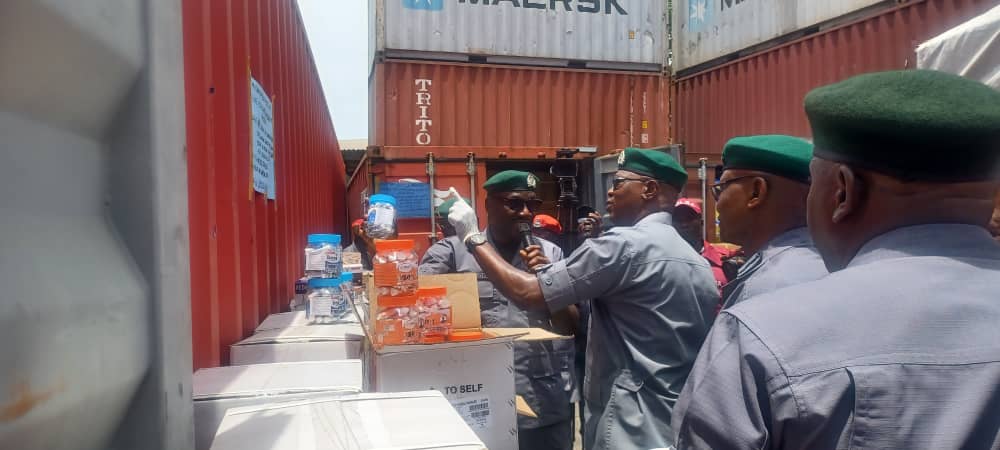The Comptroller-General of the Nigeria Customs Service (NCS), Adewale Adeniyi, has announced the interception of drones, fake and unregistered drugs, as well as expired food items with a Duty Paid Value (DPV) of ₦921 million.
He made this disclosure during a press briefing held on Wednesday at Apapa Port, where he commended the Customs Area Controller of the Apapa Command, Comptroller Babatunde Olomu, for his exemplary leadership and effectiveness in anti-smuggling operations.
According to the Comptroller-General, the seizures were made between January and April 2025 and consisted of eleven interceptions, including five 40-foot containers, two 20-foot containers, and four other seizures of contraband items that were loosely concealed.
He stated that the Nigeria Customs Service has intensified surveillance at all official points of entry, particularly seaports, airports, and land borders, in alignment with the National Strategic Economic Development Plan and the Executive Order on Port Operations.
Adeniyi expressed concern over the increasing sophistication of smuggling tactics, particularly within Nigeria’s maritime domain, with Apapa Port being a major target.
Intelligence reports, he said, indicate a noticeable rise in attempts to smuggle prohibited and restricted items via container shipments in the first quarter of 2025 when compared to the same period in 2024.
He strongly condemned the proliferation of unregistered pharmaceutical products being smuggled into the country without regulatory approvals and proper quality assurance certifications.
He warned that such products pose a severe threat to public health and could cause significant mortality if allowed to infiltrate the domestic market.
He explained that a large portion of the seized goods included unregistered pharmaceutical products without the mandatory registration numbers and certifications from the National Agency for Food and Drug Administration and Control (NAFDAC), which contravenes Section 28 of the NAFDAC Act Cap N1 LFN 2004 (as amended).
A substantial part of the seizures also included expired food items deemed unsafe for consumption, and controlled equipment such as drones and telecommunications devices that were imported without the required End-User Certificates from the Office of the National Security Adviser (ONSA), as mandated by the National Security Agencies Act.
The Comptroller-General further disclosed that a meticulous analysis of the seizures revealed a concerning trend involving sexual enhancement drugs, as five of the eleven cases involved different forms of sildenafil citrate and similar medications.
He described this as a worrisome development, citing the potential cardiovascular complications and harmful drug interactions associated with unregulated consumption of such substances.
He also noted a pattern of deliberate misdeclaration by importers, who classify pharmaceutical products as general merchandise or cosmetics to evade regulatory scrutiny. This, he said, indicates a calculated attempt to circumvent customs procedures and suggests the presence of organized smuggling networks rather than isolated cases.
He emphasized that the presence of communication devices in the seized consignments points to possible uses beyond recreational purposes, while the standardized packaging and volume of sexual enhancement drugs suggest that these are part of an established commercial operation with defined pricing structures.
The Comptroller-General added that the complexity and combination of contraband in each shipment—ranging from pharmaceuticals to food items and restricted technology—reflect the activities of sophisticated criminal networks with advanced logistics capabilities.
He commended the officers of the Apapa Port Command for their professionalism, vigilance, and dedication, which made the interceptions possible.
He also noted that enhanced inter-agency collaboration with organizations such as NAFDAC, the National Drug Law Enforcement Agency (NDLEA), and ONSA has significantly bolstered enforcement efforts and enabled greater operational success.
He stated that intelligence analysis has shown that the intercepted contraband serves as a revenue source for transnational criminal groups and as an operational enabler for non-state actors whose actions threaten national security.
Also speaking at the event, the Director of Port Inspection at NAFDAC, Olakunle Olaniran, confirmed that many of the seized drugs were fake and falsified, posing significant risks to public health. He urged Nigerians to refrain from self-medication and instead seek proper diagnosis and treatment at certified health facilities.
